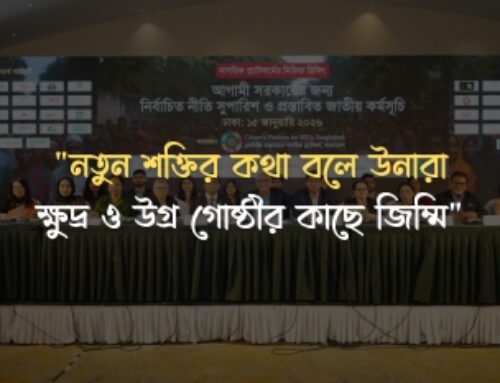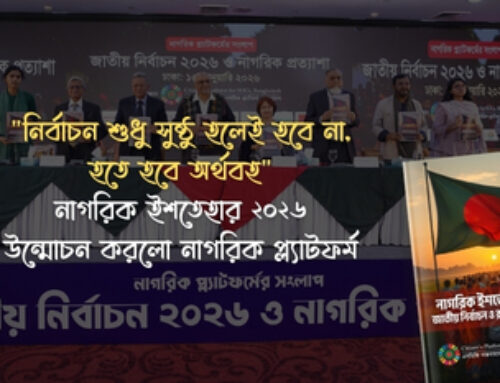Youth in Bangladesh do not belong to any homogenous group; instead, it incorporates gender diversity, disability, ethnic/religious minority, and vulnerable groups, including refugees, geographically or professionally lagged behind community, etc. At the same, the youths have been considered as the driving force towards the country’s development. Undoubtedly, the ongoing pandemic is leaving an adverse effect on their education, employment situation and mental condition adding a new form of disengagement to the youth cohort. Moreover, the pandemic has brought the ‘digital divide’ issue to the fore as one of the major indicators to identify who is more economically and socially “disengaged” and to what extent. The situation is even worse for the youth belonging to the lower-income cohort. There are still issues regarding the determinants and manifestations of the suggested voluntary and involuntary alienation of the youth in Bangladesh economy and society.
In this backdrop, a virtual dialogue on ‘Disengaged Youth’ in Bangladesh: Who, Why and How? was held on 11 August 2021, jointly organised by the Citizen’s Platform for SDGs, Bangladesh and UNDP Bangladesh on the occasion of International Youth Day 2021.

In his welcome remarks, Dr Debapriya Bhattacharya, Convenor, Citizen’s Platform for SDGs, Bangladesh and Distinguished Fellow, Centre for Policy Dialogue (CPD) laid the discourse of the discussion on ‘disengaged’ youth in four issues – 1) Analysing the validity of exploration of youth disengagement as a substantial analytical concept for empirical substance as well as policy dimensions. 2) Exploring who belong to the disengaged community of youth and to what extent. 3) Reviewing the point of departure for the overwhelming and evolving number of youth who are being alienated from economic, political and social norms and practices. 4) Exploring an effective solution besides the existing youth-centric institutions and policies that have not yet been visibly successful in capturing the youth’s aspirations and challenges in Bangladesh. He also mentioned that there is a difference between alienated and disengaged youth.
Mr Sudipto Mukerjee, Resident Representative, United Nations Development Programme (UNDP), Bangladesh, gave the introductory remarks and emphasised this year’s International Youth Day theme of “Transforming food systems”. Focusing on an accelerated achievement of the SGDs, he mentioned that the youth community needs to come forward to achieve responsible consumption and production. He also added that we need to find more innovative ways to accelerate efforts to address the skills and information gap, which have become more visible due to the pandemic. The digital divide, access to information and the incurring cost are the main challenges in our country.
Researcher and Activist Ms Maha Mirza was present as a discussant and put forward her view that we are experiencing a lack of policy discourse to address the huge number of the youth population disengaged from the country’s socio-economic development process. Tashnuva Anan Shishir, Transgender rights activist and news anchor of Boishakhi Television, also points out the absence of specific policies and other legal facilities. Also, the lack of awareness and social stigma for the transgender community is leaving the youth community behind. Mr Joshiah Sangma Chibol, Disability Rights Activist, Physically-challenged Development Foundation (PDF), mentioned that people with disabilities are not a homogenous group, rather there are many dimensions to it. Different types of physical disability and social stigma prevents them from accessing general education and basic rights, which needs to be addressed for future development. Mr Shamim Ahmed, Executive Director, Youth Engagement for Sustainability (YES), Bangladesh, said that more focus should be on youth skill development and employment to contribute more towards the economy. He suggests that the policies should not be urban-centric only. Mr Mohon Rabidas, Tea Garden Worker Rights Activist, commented that the youth of the tea garden workers community are mostly disengaged from the outside world and do not even receive proper education, for which they are unable to raise their voice. Ms Jimi Amir, Project Manager, ESDG4BD, Bangladesh Open Source Network (BdOSN), feels that the term “disengaged” needs to be accurately defined to address the overall youth disengagement.
The dialogue was moderated by Mr Towfiqul Islam Khan, Senior Research Fellow, Centre for Policy Dialogue (CPD), Dhaka.
Mr Avra Bhattacharjee, Joint Director, Dialogue and Outreach, Centre for Policy Dialogue (CPD), recited poetry and Mr Tony Michael Gomes, Director, Technical Program, Advocacy and Communications, World Vision Bangladesh performed a song as part of the dialogue’s Cultural performance.
The dialogue brought together a selected group of youth representatives, cultural activists, media professionals, adivasi, dalits, persons with disability, labor rights activists, NGO representatives and social workers.




